The Main Causes of Food Waste in Australia: Understanding and Addressing the Issue

What are the main causes of food waste in Australia?
Food waste is a critical issue in Australia, with approximately 7.3 million tonnes discarded annually. This waste has significant economic, environmental, and social implications. Understanding the main causes of food waste is essential for developing effective strategies to mitigate this growing problem.
1. Consumer Behavior
One of the primary contributors to food waste in Australian households is consumer behavior. Many people tend to over-purchase groceries, leading to excess food that often spoils before it can be consumed. A lack of meal planning and preparation can exacerbate this issue, resulting in items being forgotten at the back of the fridge. Additionally, misconceptions about food labeling—particularly confusing "best before" with "use by" dates—often lead to premature disposal of edible food.
2. Retail Practices
The retail sector significantly influences food waste levels. Supermarkets impose strict aesthetic standards, which often results in the rejection of perfectly good produce that doesn’t meet their visual criteria. Fruits and vegetables that are misshapen or slightly blemished are frequently discarded rather than sold. Furthermore, retailers often rely on markdowns for products nearing their expiration dates, which can lead to unsold items being wasted instead of donated.
3. Supply Chain Inefficiencies
Food waste is prevalent throughout the supply chain, from farms to distribution centers. Inefficient logistics, such as poor transportation and storage facilities, can lead to spoilage before products even reach the shelves. Additionally, fluctuations in consumer demand often result in overproduction, with surplus food going unsold and ultimately wasted.
4. Lack of Awareness
A general lack of awareness about the scale and impact of food waste contributes to the problem. Many consumers do not realize the resources involved in food production and the environmental consequences of waste. Education and outreach can play a vital role in changing attitudes and encouraging more sustainable practices.
5. Cultural Attitudes
Cultural attitudes towards food can also contribute to waste. Large portion sizes and societal expectations for lavish meals can lead to food being prepared but not eaten. Leftovers are often discarded rather than reused or repurposed.
Conclusion
To tackle food waste effectively, Australia must address these underlying causes. By promoting awareness, encouraging responsible consumer behavior, and improving practices across the supply chain, the nation can reduce food waste significantly, benefiting both the environment and society.
Featured Posts
-
The Circular Economy: How Beyond Best Before is Leading the Way in Australia
![The Circular Economy: How Beyond Best Before is Leading the Way in Australia]()
-
How to Save Money on Groceries
![How to Save Money on Groceries]()
-
Debunking Misconception #5 - “Beyond Best Before is the same as a food bank.”
![Debunking Misconception #5 - “Beyond Best Before is the same as a food bank.”]()
-
Debunking Misconception #3: “Shopping at Beyond Best Before is only for people on a budget.”
![Debunking Misconception #3: “Shopping at Beyond Best Before is only for people on a budget.”]()
-
Debunking Misconception #2: “The Food Is Low Quality or Off.”
![Debunking Misconception #2: “The Food Is Low Quality or Off.”]()







Comments